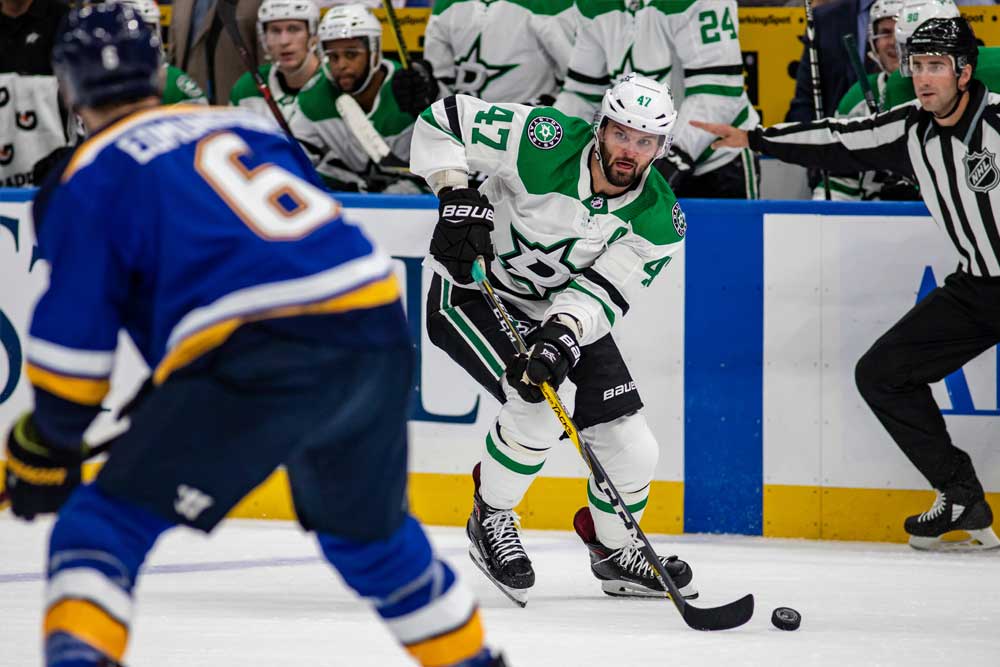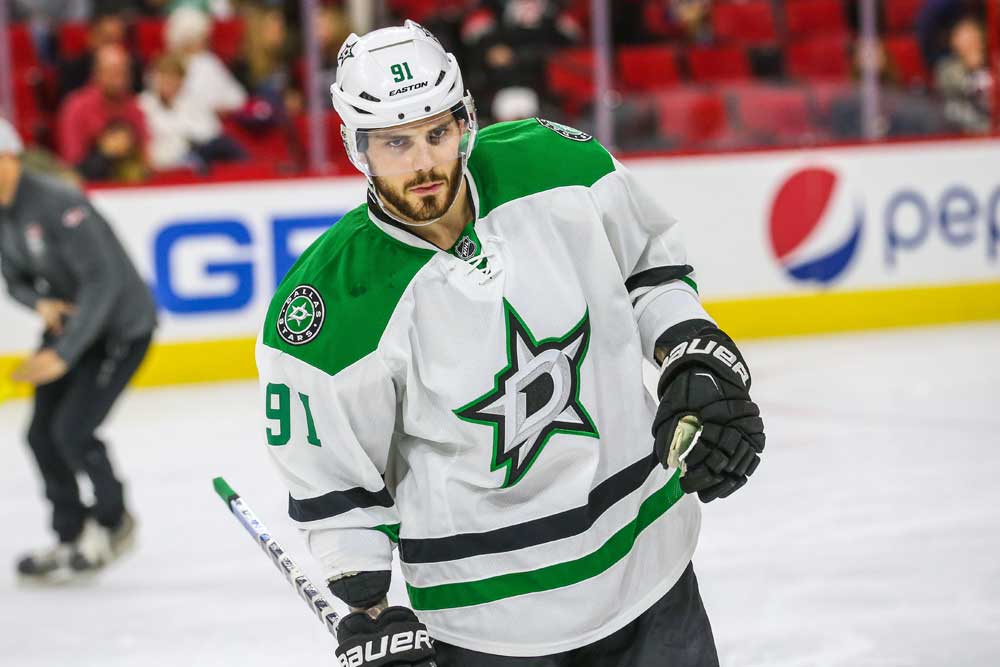Dallas Stars CEO Pointing Finger in the Wrong Direction
When Dallas Stars CEO Jim Lites vented to reporters about his top forwards on Friday morning, one couldn’t help but let out a reflexive “Are you serious?” It’s not that Jamie Benn and Tyler Seguin are beyond reproach — recent history shows they can certainly play better. However, qualifying their performance as “terrible” is a real stretch.
Frankly, the tirade comes off as disingenuous. Anyone watching the games should realize there are much bigger fish to fry in Dallas.
Benn and Seguin were essentially ripped into for the shortcomings of others, and the Stars’ lesser-known players probably didn’t feel great about letting their leaders take the fall. They translated those pangs of guilt into three even-strength goals on Saturday night in a 5-1 win. Granted, this came against a struggling Detroit Red Wings squad, but an ounce of progress is better than none at all.
Through 39 games, Seguin (33 points), Benn (30 points) and linemate Alexander Radulov (31 points in 29 games) are clearly the team’s offensive catalysts. That’s to be expected given their respective salaries. However, the next closest player is 35-year-old Jason Spezza (21 points) — and he isn’t close.
There’s simply no scoring depth on this club, which has resulted in the 27th-ranked offense in the league.

Drafting is crucial in this era because franchises can’t simply buy a potent offense anymore. They need to manufacture one from a mixture of established stars and up-and-comers on friendly contracts. It’s safe to say the Stars have missed the mark in this respect: Former first-round picks Radek Faksa (14 points), Jason Dickinson (11 points) and Valeri Nichushkin (5 points) have all failed to carry over their upside as prospects.
Faksa should be commended for embracing a two-way game, as he can match up against the opposition’s top forwards and hold his own defensively. But his total lack of offense has yielded a team-worst 37.8 GF%. While Dickinson is similarly reliable in all three zones, he’s equally inept as a play-driver who can tilt the ice and create chances for his club (43.4 CF%, 45.9 SCF%).
Nichushkin is perhaps the most egregious case. Jaromir Jagr once suggested that Dallas’ 10th overall selection in 2013 would become the best player in the world. It was a bullish claim to be sure, but there were reasons for optimism. The 6’4”, 210-pound winger displayed good skating, hands and an understanding of his frame. Following a couple of decent campaigns to start his career, the 6’4”, 210-pound Russian bolted for the KHL. Since returning, he appears to have forgotten how to play NHL hockey.
The hulking forward looks lost out there, devoid of the creativity or net drive he flashed in his first two seasons. He almost seems afraid of making a mistake, which is the last quality you want to see out of a skilled forward. With top-end players, you always take the good with the bad.
Part of this could stem from head coach Jim Montgomery’s system. He’s employed a more defense-oriented approach and now boasts the third-lowest goals-against average in the league.
On the flip side, this diligence has hamstrung the team’s offense. Beyond Spezza and Devin Shore, virtually everyone on the roster has seen their production dip — Seguin and Benn are obviously included. Blake Comeau, who posted 34 points just a season ago, is on pace for 15 points. Faksa, Mattias Janmark and Tyler Pitlick are also feeling the effects of this new system. Those are sources of depth scoring that have run completely dry.
If Dallas could generate more consistent support, Lites’ misguided comments would have never surfaced in the first place. “Game in, game out, the best players on other teams are outplaying the best players on our team,” he said. That’s…an interesting take.
On a team that is routinely dominated in shot attempts (46.1 CF%, 29th) and scoring chances (47.9 SCF%, 23rd), Benn and Seguin nearly break even in those departments while controlling over 60% of the goals scored. And they do this against the opposition’s best defenders. In other words, despite absorbing the toughest match-ups and setting the table for their teammates, they still perform better under their circumstances than the depth players do in theirs.
How anyone can reach the conclusion that Benn and Seguin are the main problems is baffling. Can they be better? Of course. Ideally, Benn would regain some of the snarl and savvy decision-making that made him such an imposing power forward a couple of seasons ago. Seguin should command the puck in the neutral zone and dictate the flow rather than playing within it.
But a player of Benn’s mold ages poorly. He’s 29 now and will only become less assertive in the years ahead. Seguin, meanwhile, is a streaky scorer. He’s not the type of galvanizing figure who will single-handedly carry a team on his back.
“He used to be a pest to play against,” Lites said of Seguin. “People hated playing against Tyler Seguin. They don’t anymore.” Wait, what? If anything, Seguin has always been too easy to play against.
That quote may well highlight the core issue underlining Lites’ outburst: Management can’t see the forest for the trees.
Benn and Seguin are very good players. They’re not elite, though, and expecting them to produce like elite players will only lead to disappointment. The key is seeing assets for what they are and building your roster accordingly. The Stars haven’t done so in the slightest, which makes claims such as “I think this is the most talented and deep team we’ve had in years here” laughable.
Then again, this is the same club that felt inking Martin Hanzal to a three-year, $14.25 million in 2017 was a wise investment. The lumbering 31-year-old has produced a whopping 12 points in 45 games across two injury-ravaged seasons. He may never be the same health-wise, and he was never a true offensive threat to begin with.
Your first-round picks haven’t panned out, your depth scoring is nonexistent, you’ve made no significant trades to remedy the situation and the only positive free-agent signing up front (Radulov) already slots in next to the very players you’re criticizing…but the team’s offensive woes are somehow Benn and Seguin’s fault? At some point, you’re no longer tasking them with the heavy lifting. You’re forcing them to shoulder the entire burden.
Management should take a good, long look in the mirror because the “terrible” descriptor fits them much better.
Recent Posts

How Corey Perry Is Making His Presence Felt With the Lightning
View Post »
How Adam Fox Pushed the Rangers Past the Penguins
View Post »

 PHI
PHI PIT
PIT TOR
TOR MTL
MTL TBL
TBL CHI
CHI EDM
EDM VAN
VAN COL
COL STL
STL BUF
BUF WSH
WSH NJD
NJD BOS
BOS NYR
NYR NYI
NYI DET
DET CAR
CAR NSH
NSH CBJ
CBJ WPJ
WPJ CGY
CGY ARI
ARI SJS
SJS VGK
VGK ANA
ANA LAK
LAK MIN
MIN OTT
OTT FLO
FLO DAL
DAL